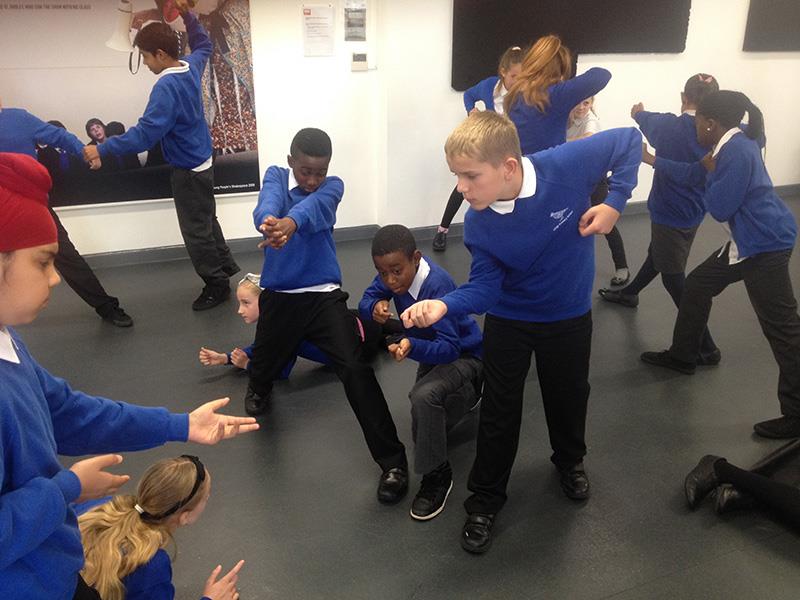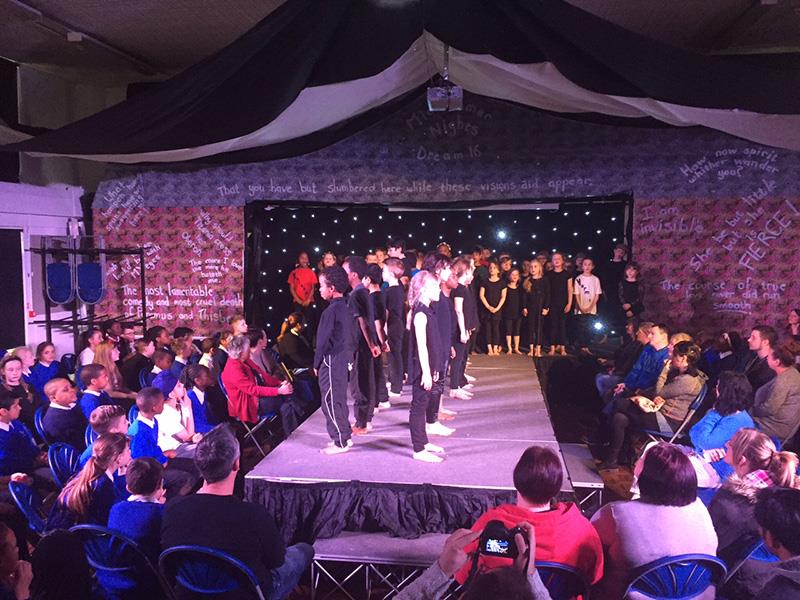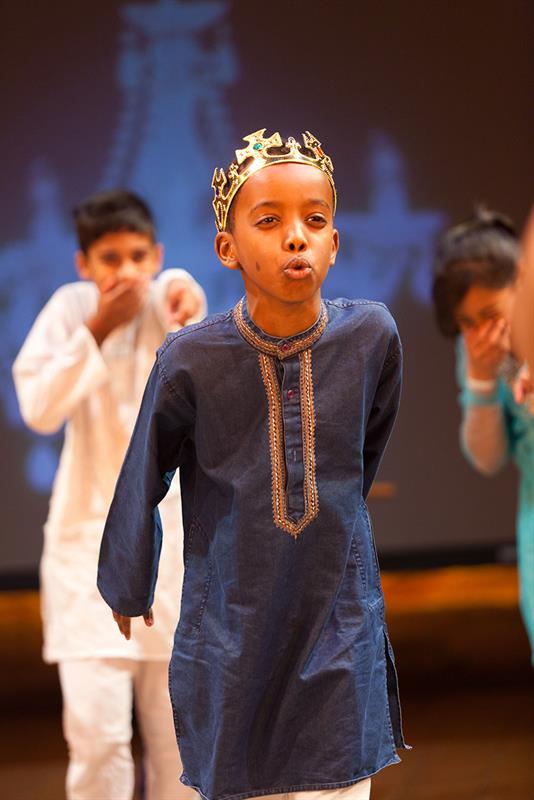When visitors walk around Lings Primary School in Northampton they often do a double-take as they hear pupils discussing the respective merits of King Lear, Macbeth and The Merchant of Venice.
At an age when most primary school children are more interested in Gangsta Granny and Diary of a Wimpy Kid, the 270 pupils at Lings, where 55 per cent are entitled to free school meals, are busy getting to grips with Shakespeare.
They quote lines from Shakespeare’s work, watch his plays and jump at the chance to play his characters on the stage. Even the youngest children in reception can talk about the characters of Titania and Oberon from A Midsummer Night’s Dream and some of the older ones have performed it at Stratford-upon-Avon and in the garden at 10 Downing Street.
Their enthusiasm for Shakespeare stems from the Royal Shakespeare Company’s (RSC) mission to make the Bard’s work “vivid, accessible and enjoyable” for children and their teachers.
With that in mind, the RSC’s education department works with around 1,800 primary and secondary schools every year, prioritising schools in areas of socio-economic disadvantage. It also runs an Associate Schools programme, where teachers explore Shakespeare using dynamic, active approaches and then take what they have learned back to their schools.


Bard work: Pupils from Lings Primary School take part in a wide range of Shakespeare-related activities, including staging productions
Jacqui O’ Hanlon, the RSC’s director of education, stresses that far from being daunted by the complexities of Shakespeare’s language, young children are eager to learn about it. They don’t want the text to be translated or just to hear the story either – they want “the real thing”.
“Children don’t have any fear of new words and new language,” she explained. “What’s wonderful about Shakespeare is that it’s full of very different, new and unusual words and when children are young they are acquiring new words and new language every day of their lives. Also, it’s built on a very natural rhythm and young children are instinctively accepting of that.”
The RSC encourages teachers to approach Shakespeare in the same way as professional actors and directors do in a rehearsal room, starting with a single word or a phrase. This could, for instance, be a phrase like Prospero’s speech from The Tempest, where Shakespeare describes a rotten, old boat as: “Nor tackle, nor sale, nor mast; the very rats instinctively had quit it.”
“The phrase is like a tongue twister,” Ms O’Hanlon continued. “Four and five-year-old children will want to say those words back – so we get them to play with the sound of the words and to imagine what they might mean.
“We start with words and phrases and characters and feelings and sounds, then work up to a whole scene and then work up to a whole play. We are trying to create a breadcrumb trail, trying to capture children’s imagination, intrigue them and create curiosity in them so they want to know more and more.
“You can never know everything about Shakespeare but what we’re trying to do is ignite a lifelong relationship with his work. It can start from very young and last until we are in our 90s.”
Ms O’Hanlon firmly believes that reading Shakespeare is “not the most effective way to encounter Shakespeare’s plays and their richness”. It is far better, as RSC Education’s manifesto declared back in 2007, to “do it on your feet, see it live, start it earlier”.
This year, the 400th anniversary of Shakespeare’s death, children at Lings Primary put on an outdoor performance of A Midsummer Night’s Dream for the local community. The school regularly takes pupils to Stratford-upon-Avon, has partnered with 12 local schools to develop their Shakespeare work and has also launched its own performing arts school on Saturdays for children who can’t afford to go to theatre schools.

Celebration: A scene from one of the RSC's regional Shakespeare festivals (Image: Stuart Hemley/RSC)
Lings headteacher Leigh Wolmarans is convinced that his school’s work on Shakespeare has had a huge impact on children and teachers alike.
“When you talk about things that could be possible reasons for underachievement our school has got them in bucket-loads,” said Mr Wolmarans, who has been head for five years. “But the key thing is not to make an excuse. You have to say: ‘okay, what can we do to raise our aspirations? What can we do to develop our learning? What can we do to make learning exciting and fun?’”
The school prides itself on its creative curriculum and when the head heard about the RSC’s work with schools three years ago he was determined to get involved.
“It has been absolutely phenomenal,” said Mr Wolmarans. “Working with the RSC has developed learning at our school. It has developed our teachers as teachers and it has engaged our children.
“If a child from an area like ours can appreciate, understand and tackle Shakespeare’s language and understand the concepts, it has an impact on their aspirations. We say: ‘Look, you’ve just tackled a text that other people might say they can’t do. If you can do that, imagine what you can do in life.’”
The pupils agree wholeheartedly. A young boy who speaks English as a second language told the head: “Shakespeare has taken me out of the box and has opened up my mind to think in very different ways.”
A girl said: “I always thought Shakespeare wrote very sad plays where everyone died. They are so much more than that. He makes you understand language and he opens up history in a way that I have never seen before.”
Anita Jefferies, who has been headteacher at Archibald Primary School in Middlesborough for nine years, tells a similar story. Like Lings Primary, Archibald Primary is in an area of high deprivation. Fifty-four per cent of the 420 children are eligible for free school meals and pupils speak 22 languages between them.
Archibald Primary started working with the RSC four years ago, after Ms Jefferies spotted the opportunity and applied to take part.
“Children like ours don’t think Shakespeare is for them and including them in something that is so inspirational has been amazing. We had to be interviewed by the RSC but they saw our commitment and enthusiasm and chose us.”
Ms Jefferies was determined from the outset that the project should involve the whole school and involve parents and the wider community too. Archibald Primary now shares its work with 12 other schools in the area.
“It’s been mind-blowing,” she said. “Not only are the children performing the plays but it has impacted on the written work they do and the vocabulary they use, particularly the boys. What really engages the children is that when you unpick Shakespeare’s stories and plays they are about very relevant themes for today – dysfunctional families, sibling rivalry, good and evil.
“We start with a very small amount of text and build upon it and use freeze frames so they begin to understand the language. We don’t give them a huge chunk of text to begin with. I hadn’t realised before that this is how professional actors work. They get into the characters, pick key words and key bits of text and play around with it – and that’s how we do it with the children.”
Ms Jefferies and her team have woven their Shakespeare work into every aspect of the curriculum. When year 5 pupils take on King Lear they look at Shakespeare’s characterisation and the sibling rivalry between Goneril and Regan. A group of reception children use the same active approaches to learn about the life cycle of a frog as they apply to their
Shakespeare work. First of all they are introduced to “quite difficult” scientific vocabulary. Then they go into the school hall and act out the life cycle before returning to the classroom and writing about it.
The head has also seen an improvement in the children’s use of punctuation. “The RSC has taught us how to read from punctuation mark to punctuation mark,” she said. “The children now notice punctuation a lot more and use it in their own writing because of how Shakespeare used it. It has impacted on our attainment on so many levels.”
The children have become more confident too. “We took a group of pupils to 10 Downing Street and they performed in front of David Cameron,” said Ms Jefferies. “These were children from Middlesborough who had never been to London before but they weren’t fazed by it at all.”
Earlier this year a young Romanian boy who did not speak English when he started at Archibald Primary took on the part of Prince Hal when the school performed Shakespeare’s history plays six months after his arrival.
“He was one of the main characters,” said Ms Jefferies. “Because of the way we work with the children and use small bits of text he was able to engage with the language and increase his vocabulary very quickly.”
The staff have grown in confidence as well, many of them declaring that the project is “the best thing” they have done in their teaching careers.
“When we have training days it’s fun and when you see the children working with the teachers it’s fun,” said Mrs Jefferies. “Everyone is laughing and enjoying themselves – and that’s how they learn.”
- Emma Lee-Potter is a freelance education writer.
Further information
For more on the RSC’s education programmes, visit www.rsc.org.uk/education
